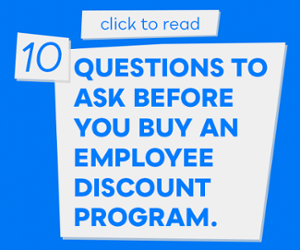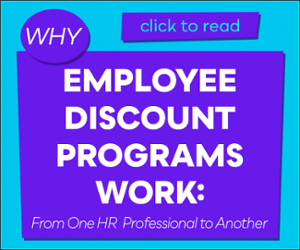There are few things more satisfying than to look out over a business you had a hand in building, and seeing how the lives of the employees intertwine.
To see teams come together in their working lives but also on a personal level. To see people from different divisions or separate offices form friendships.
These relationships that form within a company become the fabric of its culture. Employees who develop personal relationships are happier, more productive, and easier to retain. They root for their peers to do well, and are more willing to recommend their workplace to others.
From our collection of employee engagement and loyalty stats:
- 54% of employees say a strong sense of community kept them at a company longer than was in their best interest (Gusto)
- 58% of working Americans claim that their coworkers are more productive at work when they're happy (Ultimate Software)
- 37% of employees say “working with a great team” is their primary reason for staying (Gusto)
- 55% of employees have put off job hunting because they didn’t want to leave their co-workers (ICIMS)
- 54% of workers say they like the people they work with (CareerBuilder)
The personalities of those you hire obviously play a major factor in the camaraderie of your office. But the various benefits and corporate perks you offer can accelerate togetherness and trust in the office.
12 Employee Perks that Build Camaraderie
If you’ve hired good people with friendly personalities, all you need to do is present opportunities for them to get together.
As nice as it would be to assume that will happen on its own, an investment by the company into employee gatherings will probably be necessary. This is best accomplished through your employee perks, positioning the opportunities to get together with fellow employees as a positive benefit.
Start with any number of these ideas - most of which are low-cost and low-effort.
- Volunteering
 Like many of the opportunities listed here, volunteering has many side benefits other than getting employees together. It’s good for the community, and creates a positive shared experience for your people.
Like many of the opportunities listed here, volunteering has many side benefits other than getting employees together. It’s good for the community, and creates a positive shared experience for your people.
The caveat here, however, is you should do it on the clock. Give people the chance to get away from their desks and the participation rate will be much higher.
- Team Lunches (bonus points for picking a place on your employee discount program)
Getting out of the office for a team lunch may take some planning and a small investment, but there are casual conversations that will happen around a shared meal that would never happen in an office.
A big bonus that Access Perks clients are encouraged to take advantage of? Let employees pick a restaurant participating in their employee discount program.
Winner, winner, chicken...lunch.
- Coffee Breaks
Most companies seem to have figured this one out. There are many positive effects of a coffee machine, or even a water cooler. On one hand, employees aren’t wasting 20 minutes getting a cup at the convenience store down the road. On the other, they’re making small talk with people they may never have otherwise met.
- In-Office Happy Hours
Unless your business is in an urban area, chances are the traditional post-work happy hour isn’t a thing in your company. The right amount (a.k.a., one or two drinks) of alcohol can loosen people up and generate personal conversations.
On a related note, look for an employee discount network with deals at ride-sharing services and taxis. *wink wink*
Alcohol not your thing? The same positive effects can come from an ice cream social or tapas. The key is special treats not normally seen in the office, with the employer’s permission.
- Birthday Treats

As cringeworthy as the birthday cake scene from Office Space is, pulling people away from their desk for some cake, or going out for a birthday lunch is something anyone can enjoy. Just make sure there’s enough cake for everyone.
- Off-site Retreats
See a recurring theme, here? Good vibes happen between people when you remove the cubicle wall, or in this case, the office altogether. It doesn’t have to be overnight, but rent a nice space and get people in a special environment.
JustWorks has a nice guide to running a successful offsite meeting, especially if your goal is creative juices.
- Mentoring
Pair every new employee with a veteran from another department. Encourage them to meet regularly and give them specific topics to cover. Things like the history of the company, what each department does, who the clients are, what the veteran’s success is measured by.
Besides the obvious personal connection, this will help every employee get a wider grasp of the company and how other departments measure success.
- 2x2 Cross-Functional Teams with Other Departments
Identify needs that could be better met in the company and form cross-functional teams from diverse departments to find solutions. It gets people working together, but ultimately results in a better experience for your customers because of the diverse perspectives.
- Peer Recognition
This one might be as simple as leaving out pens and pads in the break room, with a note encouraging employees to write about people they’ve noticed doing great work. Or, you can make it more formal and throw out gifts for employees who nominate or are nominated for doing good deeds.
You have employees who are busting their tails yet feel no like one is noticing. Whether it’s from a peer or the CEO, recognition matters more to people than just about anything.
- Gift Exchanges
The old Secret Santa program works - so long as you place restrictions on it. It can go sour when one guy gets a new TV while everyone else walks away with socks or an “as seen on TV” panini grill.
The Chicago Tribune’s Rex Huppke has some great ideas if you’re willing to move away from simple gifting.
- Learning Conferences
Pick an industry conference and send a few employees off to learn and network. This can be expensive, especially after transportation and lodging, but look at the bigger picture: your people are out of the office, learning together, and getting to know each other.
Try to give the opportunity to every employee; not just bigwigs or the sales team. Bonus points if you can help employees get closer to the goals you outlined in their IDPs.
Extend the benefit by giving them the assignment to report their learnings back to the company upon their return. Don’t ask for a full treatise; a nice summary of key takeaways is good enough.
- Sponsored Sports Teams
Find a local kickball league, or pay for a three-on-three hoops team to enter the local corporate tournament. Like volunteering, great relationships are formed when people have a positive shared experience or challenge to overcome. In this case, they’re going to have fun while relying on each other - always a positive for friendships.
Don’t Let Your Office Turn Into Game of Thrones
Some companies may thrive in cutthroat worlds where employees are pitted against each other like Lannisters, Targareyans, Starks, and Baratheons. Good for them, I guess.
 That model is dying, however. People don’t want to be on edge for eight hours a day. They don’t want to feel gross about their jobs, or have to constantly throw others under the bus just to stay ahead.
That model is dying, however. People don’t want to be on edge for eight hours a day. They don’t want to feel gross about their jobs, or have to constantly throw others under the bus just to stay ahead.
Specifically, Gens Y and Z aren’t having any of that “battle your coworkers” nonsense:
- 57.3% of Millennials seek friendly coworkers (NSHSS)
- 88% of Millennials want their coworkers to be their friends (MTV)
- 69% of Millennials say the people whom they work with would enable their best work (Millennial Branding/Randstad)
- One-third of millennials think socializing with coworkers will help them move up the ladder (compared to 5% of Baby Boomers) (LinkedIn)
- 54% of Gen Z say the people they work with is the attribute that matters most in order to do their best work (Future Workplace)
We've said multiple times that the "other stuff" that happens in an office has great value. People aren't robots, and you didn't hire them to be robots.
A certain degree of connectedness will occur naturally, especially among teams. Take the next step and bake it into your benefits and perks, and open the opportunities to everyone on every team.




